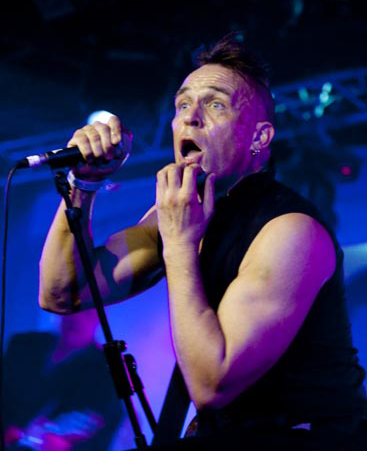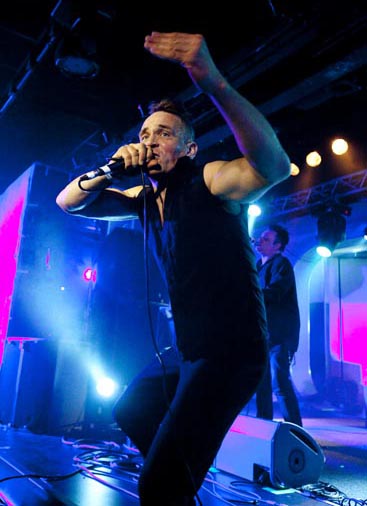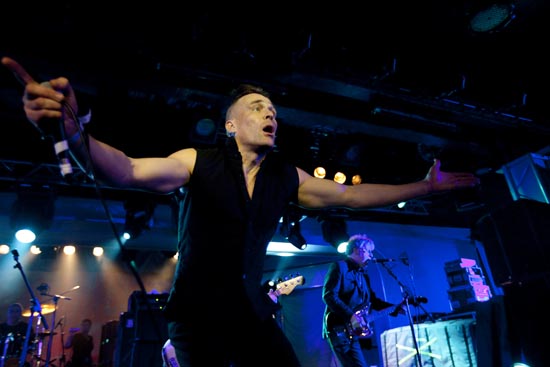Listen to The Membranes on Spotify
Music Festivals can slide into into one big blur. Arise, feeling unusual. Stumble from room to room/field to field with a wretched sense of paranoia that’s only eroded by continued consumption of ale and victuals. Who did we see? Were they any cop? THAT was disappointing.
Anyone who saw the Membranes rip apart the fan’s curated All Tomorrow’s Parties in December 2009, though, has a righteous punctuation mark slam band in the early hours of Saturday afternoon. I hadn’t known quite what to expect from the reformed Membranes, the band led by Quietus writer John Robb. Their bus probably rolled past my infant head in Bradford and Halifax during one of their never-ending tours in the 1980s, but I’d never properly connected.
More fool me. After a George Formby intro tape, cobwebs were blasted asunder. It’s not just Robb’s commanding presence (without a doubt the buffest man on site all weekend – and that includes the security) that made the reunited Membranes an ATP highlight. The reunited band are tight as hell, heavy menacing and with a hell of a lot going on – as much discord as thundering punk discharge, early Sonic Youth with a sense of humour, dirtier take on American punk rock, still utterly invigorating.
After having our fragile souls so perfectly cleansed that cold Saturday in Somerset, we decided to ask John Robb a few questions about what it’s like to be back…
When and why did the Membranes separate?
We had no ending. This is just the Membranes re-explosion! We just took a rest and the rest lasted for 19 years! I was getting sidetracked by the underground rave scene and the madness of those times and playing in back rooms of pubs seemed a bit boring in comparison to acid house. Then there was more stuff going on after that and the gaps got bigger between the gigs ’till the gap got to 19 years. The band was never about a conventional career- it was about momentary celebration of skewed noise and the feral wildness of discords and a 19 year break seem natural. Unlike, let’s say, X-Factor being in a band was a vehicle to creativity and not to be a pop star. And we had that great thing when you grow up together struggling to learn how to play music – the initial trio of the band grew together and we could jam songs and understood exactly where we were going.
Did writing Death to Trad Rock have anything to do with you getting back together?
It certainly made me feel interested in that period, not so much in a nostalgic way but more in an interest in the best aspects of that period – the DIY self sufficiency and the post punk experimentalism and the anti rock attitudes – not so much hating rock music but the attendant rugby club blokiness that goes with it… the idea that you could book worldwide tours and there would always been a community in every city who knew what you were doing and would look after you. That still exists to a certain extent with Goldblade but in the 80s it was the way the whole thing worked, a genuine underground scene of people who were all equally important making and providing the space for all this to happen. With the Membranes we were often the first to go out there and play those towns creating the circuit from nothing.

We would play anywhere across Europe and we did these huge two month tours around the Iron Curtain countries and into the Balkans and back up through Germany where we were pretty big and back into the UK playing beat-up towns that most people would ignore – it could get a bit dicey sometimes and we had some run ins, like a big street fight with skinheads in Lisbon. But we piledrove this circuit and then gave all the numbers to any bands that were interested – I remember giving Sonic Youth’s manager our gig list the first time they came over… that’s why Dinosaur did the video for ‘Freak Scene’ in my front garden, why My Bloody Valentine did early shows supporting us and I was lending Kevin my quadraverb and rat pedal as he worked his way towards his amazing guitar sound – everyone was sharing ideas and gear and numbers – it was a community and the great thing about ATP as that that community still existed…
Were there any obstacles that you had to overcome before reuniting?
Once we were asked it seemed like a great idea, so I got everyone together and started rehearsing. Because I tour all the time with Goldblade anyway all the infrastructure was still there – the rehearsal room, the gear, the van, the crew… and also the edge – because it’s not just about learning a bunch of riffs and getting them in the right order, it’s also about having the adrenalised edge and high octane energy to deliver it onstage and the power to actually make the music have its intense physicality – it’s certainly not shoegazing music!
I know you wrote a Guardian blog about getting the band back together, but were there any reservations that it might be a bit of retrogressive move?
It didn’t feel retrogressive. I think with music that you have written or been involved in t always feels current, it’s part of you forever and we changed the song around and put new bits in them to make them part of where we were at. There may be new songs as well – certainly got loads of ideas m- not so much to sell millions of records ha ha ha but to have music that belongs to now.
Arguing devil’s advocate, is one of the things that binds the groups in Death To Trad Rock a common theme of underachievement?
It wasn’t deliberate under achievement, I don’t think we wanted to avoid U2 style arena success ha ha ha… we were interested in being huge but on our own terms and nobody else’s, the music had to come out pure and untainted and that was our big achievement… the fact that we also managed to maintain some sort of cult status for so long was an achievement as well… a bit like the Quietus in fact!
With John Peel’s throne still vacant, the death of Plan B, and fanzines now replaced by the Internet, will that kind of scene ever exist in the UK again?
The spirit still remains and manifests itself in many different ways, from independent blogs to the live circuit which supports so many different types of music, in the 21st century we miss John Peel but we still see and hear bands playing on their own terms, you can go to a brilliant dubstep night where the groove is bent completely out of shape or listen to some warped guitar music, it’s all still there and still exists… it shouldn’t be the same that’s not the point. On the other hand I met a bunch of teenagers last week who were fascinated by the scene of bands and were taking parts of it to create their own music and since the book came out there have been loads of emails from people trying to track down the music and make their own modern version of it- the thrill of the discord and the heavy lead bass remains undiminished and the warped poetry of the lyrics is still enthralling…
Did you have any expectations when it came to playing ATP?
None at all! You should never have expectations when you play music! It had been a long time and we were added on the bill after the tickets had sold out so there was a bit of deluge of people hunting down tickets on my email, who couldn’t get in- so we wondered who would check us out… ten minutes before we played the room was empty and the a minute before we went on it suddenly filled up which was a relief.
What would you say to all the scruffy ATP indie kids who dress like American lumberjacks?
Chop down a tree!
What was the best moment for you?
Obviously the gig was great, and it was nice all the people coming up all weekend saying how much they enjoyed the show but it was great seeing all the bands- there was some great bands on… No Age were an amazing wall of sound. Fucked Up were brilliant as ever, MBV made me float, the Pastels were great, Arkestra were mind blowing, Sonic Youth were psychedelic masters…
Who was/is fat Pete/Paul (sorry neither of us quite caught the name properly) and, why was/is he The Membranes?
Pete is from Goldblade and used to be in the Nightingales – he’s a great guitar player and knew all the Membranes songs – perfect!
When you had songs like Groovy Fuckers going out, did you see yourselves as contemporaries as bands who were using drum machines and atonal guitar like PWEI, Age Of Chance or Stump?

We loved what those bands were doing but we were interested in that kind of thing before them, I was a massive Public Enemy fan but we didn’t want to copy what they were doing. I liked the idea that you could create these beats and put a collage on top of it and make music… ‘Groovy Fuckers’ came about because we spent the whole summer in an altered state watching ‘apocalypse now’ on a beat up old video recorder and listening hip hop, hardcore thrash and the Beatles White Album. We were petty insane that summer – the shared house we lived in was painted from head to toe with psychedelic paint and we decorated it with plastic dolls which we dismembered and put back together in a different order, we even painted my pet dog, there would be up to 40 people staying round the house – it was our own personal Kool Aid Acid Test… that song soundtracks that period and came out of that primordial soup of weirdness- Age Of Chance and the Poppies were utilising the same tools separately and probably with a little less of the madness that went on round our space!
How did you get to record with Steve Albini and what was it like?
I met Steve when he played in Manchester with Big Black in the late 80s. It turned out he was a big Membranes fan and really liked the sound of our records. I asked him if he could record our next album because he seemed to have some sort of idea of how to do this. English bands at the time took very little interest in how to record their music and the amazing wall of sound we got on ‘Spike Milligan’s Tape Recorder’ and the ‘Death To Trad Rock’ EP”S was down to this amazing studio, Suite 16, in Rochdale that we recorded at that time. It had this great live room and the engineer that worked there, John Brierley, was amazing. Suite 16 is THE post punk studio with an amazing catalogue of records coming out of there – from Gang Of Four to Joy Division, ACR etc etc… John had a hand in most of these records… his last record that he worked on was Death To Trad Rock – he lost his hearing after that session and had to retire!
Albini loved the sound of these records so we went to his house in Chicago and recorded in his cellar where he had a studio set up, with the mixing desk in the upstairs back room. He had copies of our fanzine, Rox, in his house and knew our stuff. Our drummer couldn’t make the session because he was knocked back by the visa people so we had to borrow Albini’s drum machine- a large wooden box that he used for Big Black – it was a nightmare to programme but it sounded amazing. We even did gigs with that drum machine which was tricky when you are used to using a drummer.
Steve then flew out to Leeds and finished off recording the album in this dingy studio that we used there – it was one of the first things that he did and I love the sound of that record which came out as Kiss Ass Godhead which was our best album… and came out all over the world, we went round the world and toured everywhere – some really mental gigs including a couple of long and wild American tours when the album came out on Homestead Records. Our support band on the first tour was White Zombie! And Dave Baker from Mercury Rev always told me he formed his band after seeing us play in CBGBs.
As with songs like ‘Tatty Seaside Town’, how much of the song was a reaction to your surroundings, and how much was it a celebration of it? Were you galvanized by an anti-London sentiment?
‘Tatty seaside Town’ was about leaving Blackpool, escaping the claustrophobia of town that was geared towards outsiders getting pissed and stag partying it on the streets, it was a kiss off to my home town but also a song celebrating its strange beauty – we were not anti London but we didn’t like the music biz and its fascination with pastel shaded 80s pop- boring as fuck! We liked playing rest of the country the strong scenes in the off the wall towns where music was turned upside down.
John’s mate Jon McArthur said that the first time he went to see the Membranes in Leeds you stopped and picked him up as he hitch-hiked home along the motorway. Was it a scene where there were few barriers between fan and band, and what problems, if any, did this cause?
There were no barriers, and it’s still the same now, you play the gig and turn into a slavering pop monster and then leave the stage and hang out and talk punk rock etc with whoever is around, dressing rooms are for dumping your bag in and getting sweaty stage clothes off. The whole scene was orientated around music and had nothing to do with rock star egos, there were no tour managers or body guards, there was no bullshit, it was about lugging your gear and playing intense wild gigs to a couple of hundred people who felt the same way about the world and then hanging out – what a great existence! Most bands sit in the dressing room and pretend to be rock stars and get people to carry their towels around for them like they are special… the stage is special the rest of it is social – this caused no problems at all!
We picked people up on the way home because we didn’t want them marooned on some motorway turning – I’ve hitchhiked a lot myself and know how despairing it can be and we felt a sense of camaraderie with the people that came to see us and we got to know, and still know, a lot of them now.
What plans, if any, do you have for future Membranes material or gigs?
There have been several offers- the next one if a big gig in Istanbul in January and then some other r festivals, there could be knew songs, I’ve got ideas piled up… a heavy bass will feature but maybe mess with the rhythms – cross the dislocated rock power with hypnotic drones, mash up some different types of music, I loved the hypnotic droning of north African music and the transcendental bliss of Indian music, or the sheer space suggested by the percussion in Turkish gypsy music – we touched on this in the Membranes in the 80s when some of the songs were written on Greek instrument like a Bouzouki… add to this feedback, shrapnel guitars, discords and my dub melodica! But it should sound big and wild and unfettered and a million miles away from the crocodile tears of modern X Factor pop…
Will it be a comfortable co-existence between The Membranes and Goldblade from now on?
Yes of course, there is time for everything! I’ve got that to do and books to right and TV shows to film and radio to do – this is a full-on splurge of creativity…



